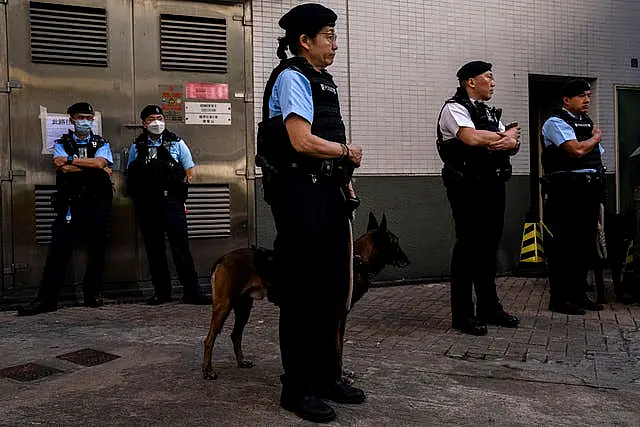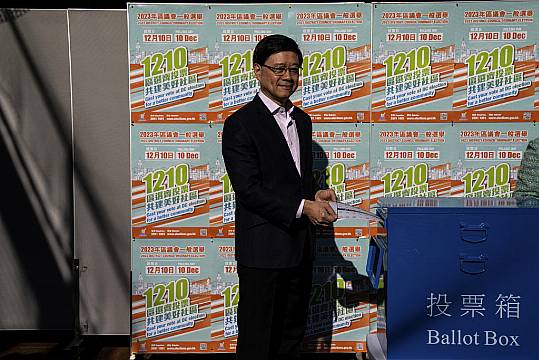Residents went to the polls on Sunday in Hong Kong’s first district council elections since an electoral overhaul was implemented under Beijing’s guidance of “patriots” administering the city, effectively shutting out all pro-democracy candidates.
Turnout is expected to be much lower than in the last elections, held at the height of the 2019 anti-government protests. Some pro-democracy voters, dismayed by the drastic rule changes, including the elimination of most directly elected seats, are turning their backs on the polls.
Members of the League of Social Democrats, one of the city’s remaining pro-democracy parties, had planned to stage a small protest to express their discontent over the electoral rule changes. But their members were arrested after being followed from home, the group said.
The police said three people were arrested on suspicion of intending to incite others to disrupt the elections, but did not provide names. Authorities also arrested three other people for allegedly inciting others to cast invalid votes on Sunday.

The final turnout in the vote will be a barometer of public sentiment toward the “patriots”-only system, the new political order under the Hong Kong government’s crackdown on dissidents following the 2019 protests — the most concerted challenge to Beijing since the former British colony returned to China’s rule in 1997.
China promised the semi-autonomous territory could retain its Western-style liberties for 50 years under the “one country, two systems” framework. But that promise has become increasingly threadbare after Beijing imposed a national security law that led to the arrest and silencing of many pro-democracy activists.
In 2021, the city amended its electoral laws for its legislature, drastically reducing the public’s ability to vote and increasing the number of pro-Beijing lawmakers making decisions for the city. After the changes, the turnout rate plunged from 58% to 30% in a legislative election that year.
The district councils, which primarily handle municipal matters such as organising construction projects and public facilities, were the last major political bodies mostly chosen by the public.
The elections four years ago held symbolic importance in the anti-government movement, with a record turnout rate of 71%. The pro-democracy camp’s landslide victory acted as a rebuke to the government’s handling of the 2019 protests.
But an amendment passed in July slashed the proportion of directly elected seats from some 90% to about 20% — a level even lower than when the bodies were first introduced in the 1980s under British rule.
A new nomination requirement has effectively resulted in the exclusion of pro-democracy candidates from the elections for the first time in about four decades. Some pro-government politicians also faced difficulties in securing enough nominations to qualify.
More than 10,000 police officers were deployed across the city to ensure the elections would be conducted in a safe and orderly manner.
The polls were initially scheduled to close at 10.30pm (14.30 GMT) but were extended by 1.5 hours, due to the failure of the electronic poll register system.
According to the latest official data, 24.5% of the city’s 4.3 million registered voters had cast their ballots after the polls had been open for 11 hours, down from 60.4% in 2019. The final turnout has not yet been announced.

Multiple politicians said the glitch would affect their chance of winning because some residents gave up voting before authorities implemented their contingency plan.
After the polls closed, Hong Kong leader John Lee said he was concerned about the incident and had requested the Electoral Affairs Commission to set up a task force to investigate the matter.
Government officials have downplayed the significance of the turnout as a measure of the overhaul’s success. On Friday, Secretary for Constitutional and Mainland Affairs Erick Tsang said not voting does not necessarily imply opposition to the elections, adding one’s non-participation could be due to other reasons.
David Lok, chairman of the Electoral Affairs Commission, said on Sunday it is not “appropriate” to directly compare the rate with the 2019 elections because the voting system, the councils’ composition and the electorate base were different in the two polls.







